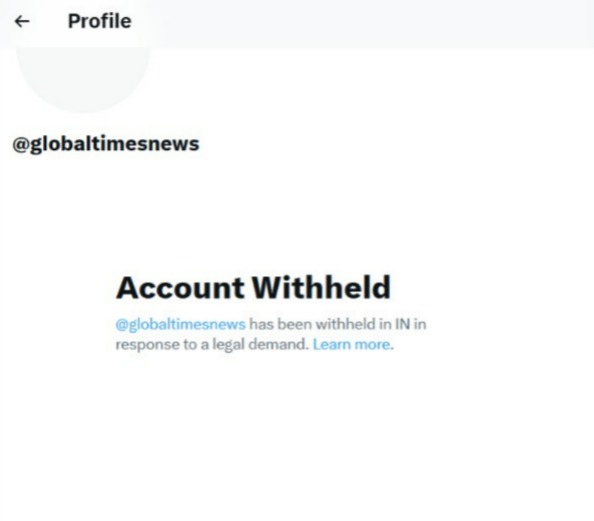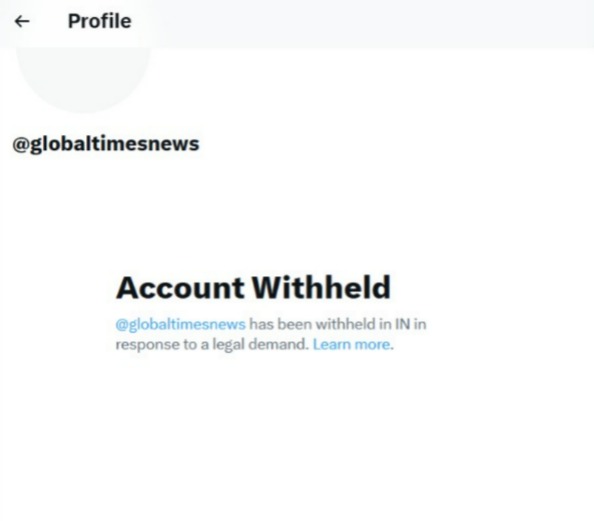
India Blocks Chinese Communist Party-backed Global Times on Social Media
In a significant move that underscores the ongoing tensions between India and China, the Indian government has taken steps to block the social media accounts of the Global Times, a publication backed by the Chinese Communist Party (CCP). This decision reflects India’s growing concerns over misinformation, foreign interference, and the geopolitical dynamics in the region. The announcement was made via a tweet by journalist Sidhant Sibal on May 14, 2025, confirming the ban and drawing attention to the implications of this action.
Background on Global Times
Global Times is known for its nationalist stance and often controversial takes on international affairs, particularly regarding China’s relationships with other countries. The publication frequently disseminates narratives that align with the Chinese government’s perspectives, making it a focal point for debates surrounding media influence and state-sponsored propaganda. Its presence on social media platforms has allowed it to reach a broader audience, which has raised alarms in various nations, including India.
Reasons Behind the Ban
Misinformation Concerns
One of the primary reasons for India’s decision to block Global Times is the rampant spread of misinformation. The Indian government has expressed concerns that the publication’s narratives could exacerbate existing tensions and mislead the public on critical issues. With the rise of digital communication, the potential for misinformation to spread rapidly has become a pressing issue, prompting governments to take decisive action.
- YOU MAY ALSO LIKE TO WATCH THIS TRENDING STORY ON YOUTUBE. Waverly Hills Hospital's Horror Story: The Most Haunted Room 502
National Security
India’s national security considerations play a significant role in this ban. The geopolitical landscape in Asia has been increasingly fraught, with territorial disputes and military posturing between India and China. By blocking a media outlet perceived to be aligned with the Chinese government, India aims to safeguard its national interests and maintain a narrative that reflects its sovereignty and territorial integrity.
Influence of Foreign Media
The influence of foreign media on domestic perceptions is another important factor. As Global Times operates under the auspices of the CCP, its content is often viewed as an extension of state policy. The Indian government appears to be taking proactive measures to limit the impact of foreign narratives that may undermine public confidence or skew perceptions of China-India relations.
Implications of the Ban
Diplomatic Repercussions
Blocking Global Times could have diplomatic implications, potentially straining relations between India and China. The Chinese government may view this action as an affront to its interests and respond with its own measures, which could further escalate tensions. This development highlights the fragility of Sino-Indian relations, which have been characterized by a complex interplay of cooperation and rivalry.
Impact on Freedom of Expression
While the ban on Global Times may be framed within the context of national security and misinformation, it also raises questions about freedom of expression. Critics of the Indian government’s decision might argue that such actions could set a precedent for further restrictions on media and speech, particularly when it comes to foreign entities. Balancing national security with democratic principles of free speech remains a contentious issue in many countries, including India.
Social Media Landscape
The blocking of Global Times is a reflection of the broader trends in the social media landscape. Governments worldwide are increasingly scrutinizing foreign media influence on domestic platforms. This action may lead to more stringent regulations on foreign media presence in India, affecting how information is shared and consumed by the public.
Future Considerations
As the geopolitical landscape continues to evolve, the implications of this ban will be closely monitored. The Indian government may need to develop a comprehensive strategy for addressing misinformation while also safeguarding freedom of expression. Engaging in dialogue with media representatives and civil society will be crucial in navigating these challenges.
Additionally, the response from the Chinese government will likely shape future interactions between the two nations. If tensions escalate, there could be broader implications for trade, diplomacy, and regional stability.
Conclusion
The decision to block the social media accounts of Global Times in India marks a significant moment in the ongoing saga of India-China relations. As misinformation and foreign influence become increasingly critical issues, governments must tread carefully to balance national security with the principles of free expression. The future of media regulation, the dynamics of international relations, and the impact on public discourse will continue to unfold as this story develops.
In a world where information plays a crucial role in shaping perceptions and policy, the actions taken by governments regarding foreign media will undoubtedly have lasting implications. As India navigates its complex relationship with China, the implications of this ban will resonate far beyond social media, touching upon issues of sovereignty, security, and the fundamental principles of democratic governance.

Breaking: India blocks the social media account of Chinese Communist Party backed Global times in India pic.twitter.com/p5vl8dBdKt
— Sidhant Sibal (@sidhant) May 14, 2025
Breaking: India blocks the social media account of Chinese Communist Party backed Global Times in India
On May 14, 2025, a significant development unfolded in the realm of digital diplomacy as India moved to block the social media account of the Chinese Communist Party (CCP)-backed publication, *Global Times*. This decision, reported by journalist Sidhant Sibal, has sparked conversations and debates about the implications of this action on India-China relations, freedom of speech, and the global media landscape.
Understanding the Context of the Block
To grasp the implications of this blockade, it’s essential to understand the background of *Global Times*. This publication, known for its nationalistic rhetoric and strong pro-CCP stance, has often been criticized for spreading disinformation and propaganda. In recent years, as tensions between India and China escalated over various issues, including border disputes and trade, the role of media has become increasingly scrutinized. By blocking *Global Times*, India seems to be taking a stand against what it perceives as hostile narratives that could influence public opinion and undermine national security.
The Implications for India-China Relations
The decision to block *Global Times* is not just a media issue; it’s a diplomatic statement. Relations between India and China have been fraught with tension, particularly following clashes in border areas. Blocking a major media outlet affiliated with the CCP could signal India’s intent to push back against Chinese influence in the region.
This move can be seen as part of a broader strategy to safeguard national interests. By controlling the flow of information, India aims to prevent the spread of narratives that could potentially incite unrest or foster anti-India sentiment. Such actions are crucial in a digital age where information spreads rapidly and can have profound effects on public perception and international relations.
The Role of Social Media in Modern Diplomacy
Social media platforms have become vital tools in modern diplomacy. They are not only avenues for communication but also battlegrounds for narratives. By blocking *Global Times*, India is asserting its control over the narratives that reach its citizens. This decision highlights the increasing importance of digital platforms in shaping national discourse.
In an age where misinformation can spread like wildfire, governments are more vigilant than ever about the content that circulates within their borders. India’s action can be interpreted as a protective measure, aiming to mitigate the risks of disinformation campaigns that could destabilize public trust.
Reactions from the International Community
The international community’s reaction to India’s decision has been mixed. Some observers commend India for taking a stand against disinformation, viewing it as a necessary step in safeguarding national interests. Others, however, argue that blocking a media outlet raises questions about freedom of speech and the right to information.
Critics may argue that such actions could set a precedent for censorship, where governments can stifle dissenting voices under the guise of national security. This debate highlights the delicate balance between protecting national interests and upholding democratic values.
The Future of Media in India
As India navigates its relationship with China and other global powers, the future of media in the country hangs in the balance. The recent blockade of *Global Times* may be just the beginning of a more significant trend where government intervention in media becomes commonplace.
There is a growing need for a robust framework that allows for the free flow of information while also protecting against harmful narratives. Striking this balance will be crucial for maintaining a healthy public discourse and fostering a well-informed citizenry.
How This Affects Indian Citizens
For the average Indian citizen, the blocking of *Global Times* could mean less exposure to alternative viewpoints. While the government may argue that this action protects national interests, it also raises concerns about the diversity of perspectives available to the public.
Access to a wide range of information sources is essential for a functioning democracy. Citizens should be able to form their own opinions based on diverse viewpoints rather than being confined to state-approved narratives. This incident serves as a reminder of the importance of media literacy and critical thinking in the digital age.
Moving Forward: Media Literacy and Critical Thinking
In light of recent events, there is an urgent need for increased media literacy among Indian citizens. Understanding how to critically evaluate sources, discern fact from fiction, and recognize bias is more important than ever.
Educational initiatives aimed at enhancing media literacy can empower citizens to navigate the complex information landscape. By equipping individuals with the tools to critically assess media content, India can foster a more informed and engaged populace.
Conclusion: The Broader Implications
The decision to block the *Global Times* account is a significant moment in India’s ongoing struggle to navigate its relationship with China and the broader geopolitical landscape. It underscores the growing importance of media in shaping public opinion and international relations.
As we move forward, the implications of this action will continue to unfold. The balance between national security and freedom of expression remains a contentious issue, one that will require careful consideration and dialogue.
By fostering media literacy and encouraging critical thinking, India can empower its citizens to engage with complex global narratives while protecting its national interests. This approach could lead to a more robust and resilient democracy, capable of withstanding the challenges of the digital age.
In the end, the blocking of *Global Times* is more than just a media blockade; it’s a reflection of the times we live in, where information, power, and national security intersect in unprecedented ways.
